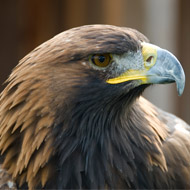Scientists unravel golden eagle genome

Golden eagles are native to the remote moorlands and mountains of Scotland.
Researchers at the Wellcome Sanger Institute are conducting a study which could help golden eagles return to areas where they have disappeared.
According to a report by BBC News, researchers at the Institute are sequencing the genome of the golden eagle because of the value of its genetic information to conserve the birds.
The study forms part of a project titled '25 Genomes for 25 Years', which aims to sequence 25 novel genomes representing UK biodiversity.
Lead scientist Dr Rob Ogden from the University of Edinburgh’s Roslin Institute told BBC News that this “blueprint for life" would aid the management of the species.
"Having a whole genome for any species is a real game-changer," he said. "It opens up a huge amount of potential research - everything from looking at the health of the bird to the ecology, to how it reproduces - and so this is the beginning of a much bigger journey into golden eagle biology.
"In future, we want to be able to screen wild birds to select the best birds to move around."
Golden eagles are native to the remote moorlands and mountains of Scotland. Although they do not have any natural predators, research shows that humans are largely responsible for their decline.
In 2008, a study by Scottish Natural Heritage found a strong association between poisoning of golden eagles and land managed for driven grouse shooting. The study found that just three of 16 regions in western Scotland had stable or expanding golden eagle populations.



 The Animal and Plant Health Agency (APHA) has updated its online reporting service for dead wild birds.
The Animal and Plant Health Agency (APHA) has updated its online reporting service for dead wild birds.